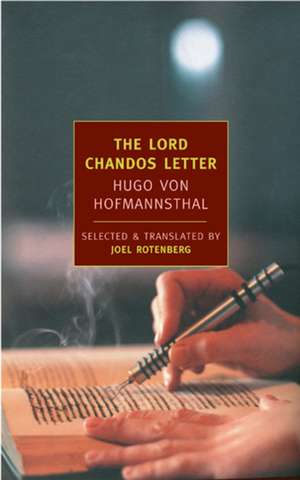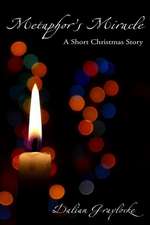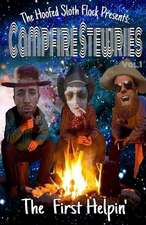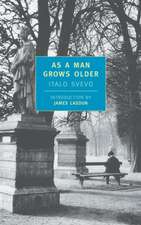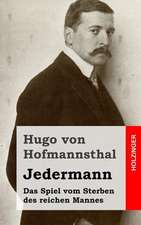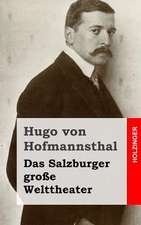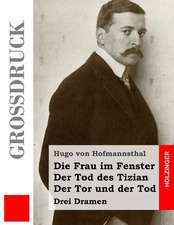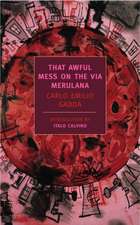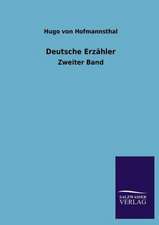The Lord Chandos Letter: New York Review Books Classics
Autor Hugo Von Hofmannsthal Traducere de Joel Rotenbergen Limba Engleză Paperback – 9 feb 2007
The most influential of all of Hofmannsthal's writings is the title story, a fictional letter to the English philosopher Francis Bacon in which Lord Chandos explains why he is no longer able to write. The "Letter" not only symbolized Hofmannsthal's own turn away from poetry, it captured the psychological crisis of faith and language which was to define the twentieth century.
Din seria New York Review Books Classics
-
 Preț: 88.86 lei
Preț: 88.86 lei -
 Preț: 99.24 lei
Preț: 99.24 lei - 16%
 Preț: 79.25 lei
Preț: 79.25 lei -
 Preț: 77.73 lei
Preț: 77.73 lei -
 Preț: 124.55 lei
Preț: 124.55 lei -
 Preț: 98.73 lei
Preț: 98.73 lei -
 Preț: 83.30 lei
Preț: 83.30 lei -
 Preț: 113.45 lei
Preț: 113.45 lei -
 Preț: 102.47 lei
Preț: 102.47 lei -
 Preț: 81.20 lei
Preț: 81.20 lei -
 Preț: 174.64 lei
Preț: 174.64 lei -
 Preț: 110.73 lei
Preț: 110.73 lei -
 Preț: 119.57 lei
Preț: 119.57 lei -
 Preț: 94.01 lei
Preț: 94.01 lei -
 Preț: 85.29 lei
Preț: 85.29 lei -
 Preț: 101.24 lei
Preț: 101.24 lei -
 Preț: 182.08 lei
Preț: 182.08 lei -
 Preț: 142.67 lei
Preț: 142.67 lei -
 Preț: 90.72 lei
Preț: 90.72 lei -
 Preț: 103.29 lei
Preț: 103.29 lei -
 Preț: 113.30 lei
Preț: 113.30 lei -
 Preț: 100.59 lei
Preț: 100.59 lei -
 Preț: 126.41 lei
Preț: 126.41 lei -
 Preț: 107.40 lei
Preț: 107.40 lei -
 Preț: 174.03 lei
Preț: 174.03 lei -
 Preț: 107.44 lei
Preț: 107.44 lei -
 Preț: 89.27 lei
Preț: 89.27 lei -
 Preț: 85.34 lei
Preț: 85.34 lei -
 Preț: 90.09 lei
Preț: 90.09 lei -
 Preț: 119.36 lei
Preț: 119.36 lei -
 Preț: 99.60 lei
Preț: 99.60 lei -
 Preț: 102.25 lei
Preț: 102.25 lei -
 Preț: 127.42 lei
Preț: 127.42 lei -
 Preț: 96.27 lei
Preț: 96.27 lei -
 Preț: 85.97 lei
Preț: 85.97 lei -
 Preț: 136.91 lei
Preț: 136.91 lei -
 Preț: 161.86 lei
Preț: 161.86 lei -
 Preț: 105.17 lei
Preț: 105.17 lei -
 Preț: 88.86 lei
Preț: 88.86 lei -
 Preț: 94.83 lei
Preț: 94.83 lei -
 Preț: 118.21 lei
Preț: 118.21 lei -
 Preț: 87.20 lei
Preț: 87.20 lei -
 Preț: 95.45 lei
Preț: 95.45 lei -
 Preț: 97.50 lei
Preț: 97.50 lei -
 Preț: 111.96 lei
Preț: 111.96 lei -
 Preț: 133.18 lei
Preț: 133.18 lei -
 Preț: 100.18 lei
Preț: 100.18 lei -
 Preț: 75.23 lei
Preț: 75.23 lei -
 Preț: 91.13 lei
Preț: 91.13 lei -
 Preț: 94.86 lei
Preț: 94.86 lei
Preț: 105.85 lei
Nou
Puncte Express: 159
Preț estimativ în valută:
20.26€ • 22.02$ • 17.03£
20.26€ • 22.02$ • 17.03£
Carte disponibilă
Livrare economică 31 martie-14 aprilie
Livrare express 14-20 martie pentru 17.67 lei
Preluare comenzi: 021 569.72.76
Specificații
ISBN-13: 9781590171202
ISBN-10: 1590171209
Pagini: 152
Dimensiuni: 126 x 205 x 12 mm
Greutate: 0.19 kg
Editura: NEW YORK REVIEW OF BOOKS
Seria New York Review Books Classics
ISBN-10: 1590171209
Pagini: 152
Dimensiuni: 126 x 205 x 12 mm
Greutate: 0.19 kg
Editura: NEW YORK REVIEW OF BOOKS
Seria New York Review Books Classics
Recenzii
The dread of the coming dehumanization, the dread of the coming silence of humanity, the dread of human suffering that proclaimed itself everywhere, this precompassion lay deep within Hofmannsthal and made him more poetic than Joyce.
— Hermann Broch
The Lord Chandos Letter states the problem of modern literature with a clarity and audacity which have surely never been surpassed.
— Stephen Spender, The New York Times
— Hermann Broch
The Lord Chandos Letter states the problem of modern literature with a clarity and audacity which have surely never been surpassed.
— Stephen Spender, The New York Times
Notă biografică
Hugo von Hofmannsthal (1874ߝ1929), the poet, dramatist, essayist, and librettist, was raised in Vienna. The son of a banker, Hofmannsthal began to publish under the pseudonym Loris when he was only sixteen. Hofmannsthal’s youth, talent, and precociousness made a splash at Café Griensteidl, the epicenter of literary Vienna; critic Hermann Bahr, in particular, was astounded that someone using the pseudonym of a “well-groomed poodle” and with the figure of a “fine, slender pageboy” could write such brilliant poetry and prose. In the following years Hofmannsthal wrote successful plays and verse influenced by the Symbolist movement. He befriended such critics and writers as Richard Beer-Hofmann, Gerhart Hauptmann, and Stefan George, for whose literary magazine he wrote. A trip to Paris in 1900 introduced him to Maurice Maeterlinck, Auguste Rodin, and Anatole France. Around that time, however, Hofmannsthal turned away from Symbolist poetry; his aesthetic crisis is recorded, in part, in his famous work from 1902, “A Letter” (often referred to in English as “The Lord Chandos Letter”), in which a young nobleman confronts the futility of language. Hofmannsthal began to work almost entirely for the stage and, in 1906, met and began to collaborate with Richard Strauss. Over the next twenty years, he produced librettos for such Strauss operas as Der Rosenkavalier, Ariadne auf Naxos, and Die Frau ohne Schatten. During World War I, Hofmannsthal worked for a propaganda agency of the War Ministry; towards the end of his life, he championed Austrian culture in the hope that art could save Europe from political violence. He died in 1929, days after his oldest son committed suicide.
John Banville was born in Wexford, Ireland, in 1945. He is the author of many novels, including The Book of Evidence, The Untouchable, and Eclipse. Banville’s novel The Sea was awarded the 2005 Man Booker Prize. On occasion he writes under the pen name Benjamin Black.
John Banville was born in Wexford, Ireland, in 1945. He is the author of many novels, including The Book of Evidence, The Untouchable, and Eclipse. Banville’s novel The Sea was awarded the 2005 Man Booker Prize. On occasion he writes under the pen name Benjamin Black.
